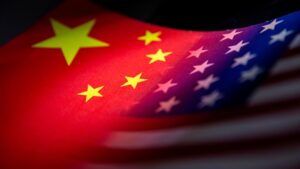The Rising Tensions in U.S.-China Trade Relations: A New Era of Economic Warfare
In recent months, the U.S.-China trade relationship has taken a notoriously contentious turn, escalating tensions and raising the stakes for businesses and investors globally. As a leader in investment insights, the Extreme Investor Network offers an in-depth analysis to help our readers navigate these turbulent waters.
The Current State of Affairs
On a recent Friday, China launched a series of retaliatory measures against the United States following the announcement of additional tariffs by President Trump. By matching the U.S. tariffs with a hefty 34% levy on U.S. goods, Beijing signaled to the world that it is prepared to adopt a hardline stance in this economic battle. This drastic move follows the initial tariffs of 10-15% China introduced earlier in the year, primarily targeting agricultural and energy products.
The Chinese Ministry of Foreign Affairs explicitly stated, "China has taken and will continue to take resolute measures to safeguard its sovereignty, security, and development interests." This indicates a possible long-term campaign against U.S. trade policies, likely ushering in an era of heightened tariffs and retaliation.
Market Implications
As an investor, understanding the ramifications of these developments is crucial. Morgan Stanley’s chief China economist, Robin Xing, has pointed out that these enhanced tariffs could shave between 1.5% to 2% off China’s GDP growth in the coming year. The impact may not be limited to China’s economy alone; global markets are already beginning to feel the tremors.
Following the announcements, we observed a significant dip in Chinese stocks, with the Hang Seng China Enterprises Index dropping over 13%—marking its worst day since the global financial crisis. Such volatility creates opportunities for savvy investors who can strategically position themselves in anticipation of these macroeconomic shifts.
The Negotiation Impasse
The tone of communication from Beijing has become markedly more aggressive, leading many economists, including those at Capital Economics, to predict that a near-term resolution to the trade war is increasingly unlikely. Previously considered a possibility, meaningful negotiations now seem distant as China’s leadership appears to be losing hope.
Adding another layer to this complex scenario, President Trump dismissed China’s latest response as a "panic move," which only exacerbates tensions and diminishes chances for a negotiated settlement. As we understand from these developments, national pride plays a massive role in the negotiations with China—becoming a potential barrier to compromise.
In a move that may seem counterintuitive, China’s government has indicated that it is prepared to use domestic economic measures to absorb the impact of U.S. tariffs. With plans to enhance domestic consumption and adjust fiscal policy accordingly, China is poised to counter potential shocks—another important factor for investors to consider.
The Risk of Decoupling
Analysts are increasingly concerned about the risk of "decoupling," where the U.S. and China move towards economic isolationism from one another. The Eurasia Group warns that if both countries continue down their current path, we could see a more comprehensive breakdown in trade relations by 2025, leading to prolonged economic consequences.
Investors should remain alert to developments in these negotiations and adjust their strategies accordingly, focusing on sectors likely to be more resilient or adaptive to the shifting landscape.
What Lies Ahead for Investors?
At Extreme Investor Network, we emphasize the importance of staying informed and agile in the face of these changes. The rising tariffs present both challenges and potential investment opportunities depending on how you position yourself.
- Sector Focus: Look for sectors that might benefit from shifting supply chains or increased domestic spending as China adjusts its economic policies.
- Global Diversification: As global markets react to U.S.-China tensions, consider diversifying your investment portfolio internationally to mitigate risks associated with significant market moves.
- Stay Informed: Following reliable sources for real-time updates will empower you to act quickly when market changes arise.
Conclusion
The evolving landscape of U.S.-China trade relations is a critical issue for investors to monitor closely. With potential ramifications that can ripple through the global economy, understanding the dynamics at play will position you ahead of the curve. At Extreme Investor Network, we are committed to providing you with the tools and insights you need to navigate these complex financial waters confidently.
Stay tuned for our upcoming analyses and strategic recommendations tailored specifically for navigating turbulent market conditions. If you want to stay ahead in the world of investing, there’s no need to look further—Extreme Investor Network has you covered.

